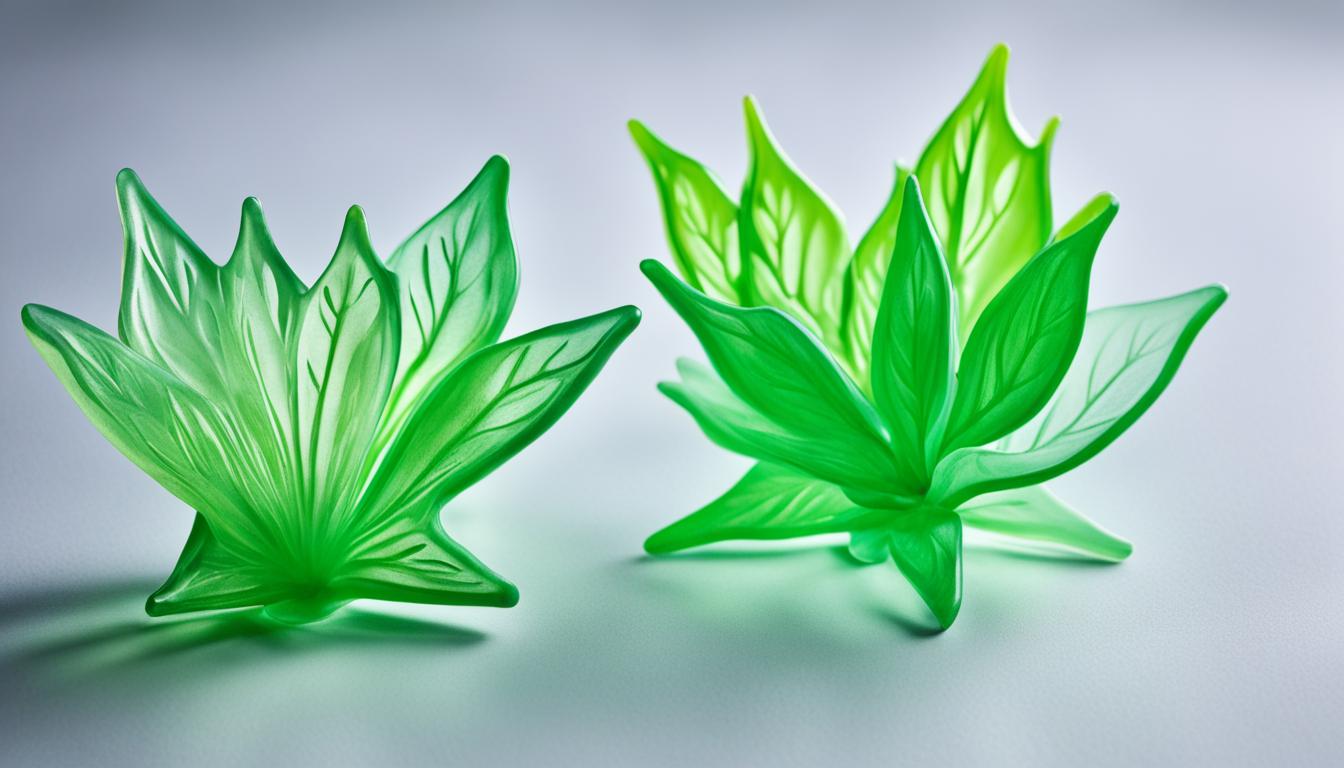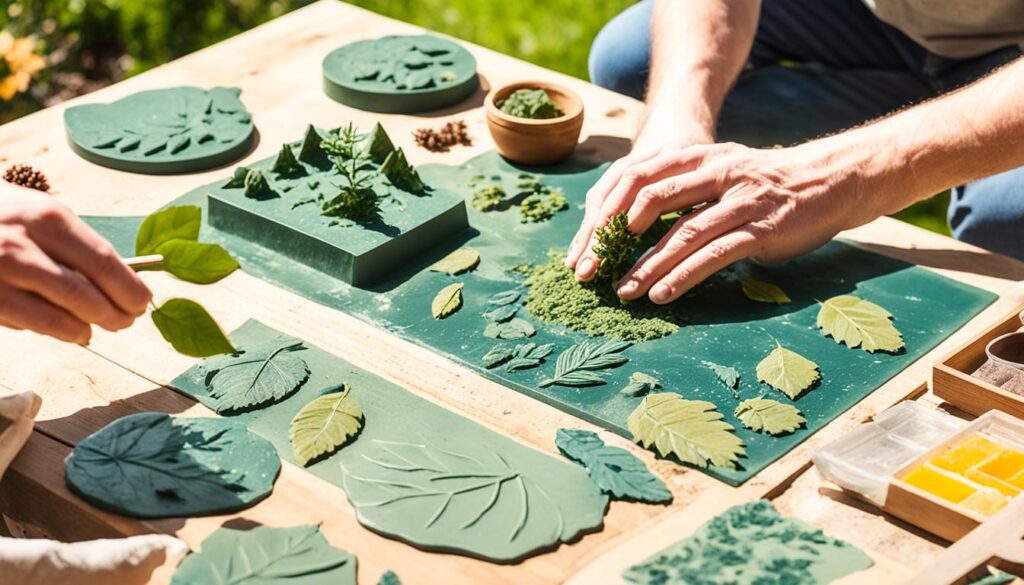
Eco-Friendly Resin Mold Alternatives Explained
In this article, we will explore various eco-friendly alternatives to traditional resin molds. As the popularity of resin casting continues to grow, it is essential to consider sustainable options that minimize environmental impact while allowing for creative expression.
Resin casting has gained immense popularity in the world of crafts and DIY projects. From jewelry making to home decor, epoxy resin casting offers endless possibilities. However, the traditional resin molds made from materials like plastic or metal can have a negative impact on the environment.
Fortunately, there are alternatives that provide sustainable solutions without compromising on quality or versatility. Let’s dive into some eco-friendly options for resin mold making.
Key Takeaways:
- Silicone molds are a sustainable alternative for resin casting and can be reused multiple times.
- Homemade molds made from natural materials like clay or alginate can reduce waste and offer customization.
- Flexible molds made from materials like silicone or latex allow for easy release without damaging the final product.
- By choosing eco-friendly mold alternatives, crafters can minimize their environmental impact.
- Resin casting supplies, including 3D printing applications, can be used with these eco-friendly mold alternatives.
Sustainable Silicone Molds for Resin Casting
When it comes to resin casting, silicone molds have emerged as a popular and sustainable alternative to traditional molds. These molds offer a range of benefits that make them a go-to choice for crafters. Let’s take a closer look at why silicone molds are the perfect option for your resin casting projects.
Durable and Reusable
Silicone molds are known for their exceptional durability. They can withstand high temperatures without warping or deteriorating, ensuring that they last for a long time. This durability allows you to reuse the molds multiple times, making them a cost-effective choice. By investing in silicone molds, you can create countless resin pieces without worrying about constantly replacing your molds.
Versatile Shapes and Sizes
One of the greatest advantages of silicone molds is their versatility in shapes and sizes. You can find silicone molds in various designs, from simple shapes to intricate patterns. Whether you’re creating jewelry, home decor, or figurines, you’re sure to find a silicone mold that fits your vision. The flexibility of silicone molds also enables you to create molds for both small and large-scale projects.
Compatibility with Resin Casting Supplies
Silicone molds are compatible with a wide range of resin casting supplies, including different types of resins such as epoxy resin and UV resin. This compatibility allows you to experiment with various resin formulas and achieve different effects in your casts. Whether you prefer the glossy finish of epoxy resin or the quick curing time of UV resin, silicone molds provide the flexibility to work with your preferred materials.
3D Printing Mold Designs
Thanks to their flexibility and precision, silicone molds can also be used in 3D printing processes to create unique and intricate mold designs. Whether you’re customizing your molds or replicating complex shapes, silicone molds offer the ability to translate your digital designs into tangible resin castings.
![]()
With their durability, versatility, compatibility, and 3D printing advantages, silicone molds are a sustainable choice for resin casting. By opting for these eco-friendly molds, you can create stunning resin pieces while minimizing your environmental impact.
Homemade Mold Making with Natural Materials
For those who prefer a DIY approach, homemade mold making using natural materials is an eco-friendly option. Materials such as clay, alginate, or even recycled paper can be used to create molds for resin casting. These materials are readily available and can be easily shaped or molded to suit specific project needs. Homemade mold making not only reduces waste but also allows for customizable and unique mold designs.
When it comes to homemade mold making, there are various materials that can be used. Clay, a versatile medium, can be molded and shaped to create intricate molds. Alginate, a natural seaweed-based material, is commonly used for making lifecasts and capturing fine details. Even recycled paper can be used as a cheap and environmentally friendly alternative for simple molds.
Regardless of the material chosen, the process of homemade mold making involves a few key steps:
Gather the Materials
Before starting the mold making process, gather all the necessary materials, including the chosen mold making material, a release agent (to ensure the resin easily separates from the mold), and any tools needed for shaping or sculpting.
Prepare the Mold-making Material
Follow the instructions provided with the chosen mold making material to prepare it for molding. This may involve mixing or kneading the material until it reaches the desired consistency.
Create the Mold
Using your hands or tools, shape the mold making material to create the desired mold. Ensure that the mold is sturdy and can support the weight of the resin. For more complex molds, consider using a mold box or support structure to hold the mold in place.
Allow the Mold to Cure
Once the mold is created, it needs to cure or dry according to the instructions provided with the chosen mold making material. This can take anywhere from a few hours to several days, depending on the material used and the size of the mold.
Release the Mold
Once the mold is fully cured, carefully remove it from the mold making material. Use a release agent, such as a mold release spray or petroleum jelly, to ensure the resin easily separates from the mold.
With homemade mold making, crafters have the freedom to experiment and create unique designs. The natural materials used also contribute to a more sustainable and environmentally friendly approach to resin casting.

By utilizing homemade mold making techniques, craft enthusiasts can unleash their creativity while minimizing waste and environmental impact.
Exploring Flexible Mold Options
When it comes to resin casting projects, flexible molds are a game-changer. These innovative molds offer versatility and ease of use, making them a popular choice among craft enthusiasts. Made from materials such as silicone or latex, flexible molds can be bent, stretched, and manipulated to release the casted resin easily.
One of the key advantages of flexible molds is their suitability for intricate or detailed designs. When working with complex shapes or delicate patterns, it’s crucial to have a mold that allows for easy removal without causing any damage to the final product. Flexible molds provide the perfect solution, ensuring that each resin cast retains its intricate details.
Another significant benefit of flexible molds is their reusability. Unlike traditional molds that may crack or break after repeated use, flexible molds can withstand multiple casting cycles. This not only reduces material waste but also saves costs in the long run. By investing in a durable and flexible mold, crafters can create beautiful resin casts time and time again.
Advantages of Flexible Molds:
- Versatility: Flexible molds can be used for a wide range of resin casting projects, accommodating various shapes and sizes.
- Easy Release: The flexibility of these molds allows for effortless removal of resin casts, preserving intricate details.
- Durability: Made from high-quality materials, flexible molds are built to last and can withstand multiple casting cycles.
- Cost-Effective: Reusable nature of flexible molds reduces the need for frequent mold replacements, saving money in the long term.
If you’re looking to explore the world of resin casting with greater adaptability and convenience, flexible molds are a must-have tool. With their ability to accommodate complex designs, easy release capabilities, and long-lasting durability, these molds offer a superior alternative for craft projects.
Conclusion
In conclusion, eco-friendly resin mold alternatives offer sustainable options for craft enthusiasts while minimizing their environmental impact. By opting for these alternatives, crafters can not only indulge in their creative pursuits but also contribute to a greener planet.
Silicone molds are a durable and versatile option for resin casting projects. Their compatibility with various resin casting supplies, including those used in 3D printing, makes them a favored choice among crafters. Additionally, their reusability ensures long-term cost savings and reduces waste in the process.
Homemade mold making using natural materials provides an opportunity for customization and creativity. Materials like clay, alginate, or recycled paper can be shaped and molded to suit individual project needs. Embracing this DIY approach not only minimizes waste but also allows crafters to create unique and personalized designs.
Flexible molds offer the advantage of easy release of resin casts, making them ideal for intricate or detailed designs. Made from materials like silicone or latex, these molds can be bent or stretched to ensure effortless removal of the finished product. The reusability of flexible molds further reduces waste and offers long-term convenience.




